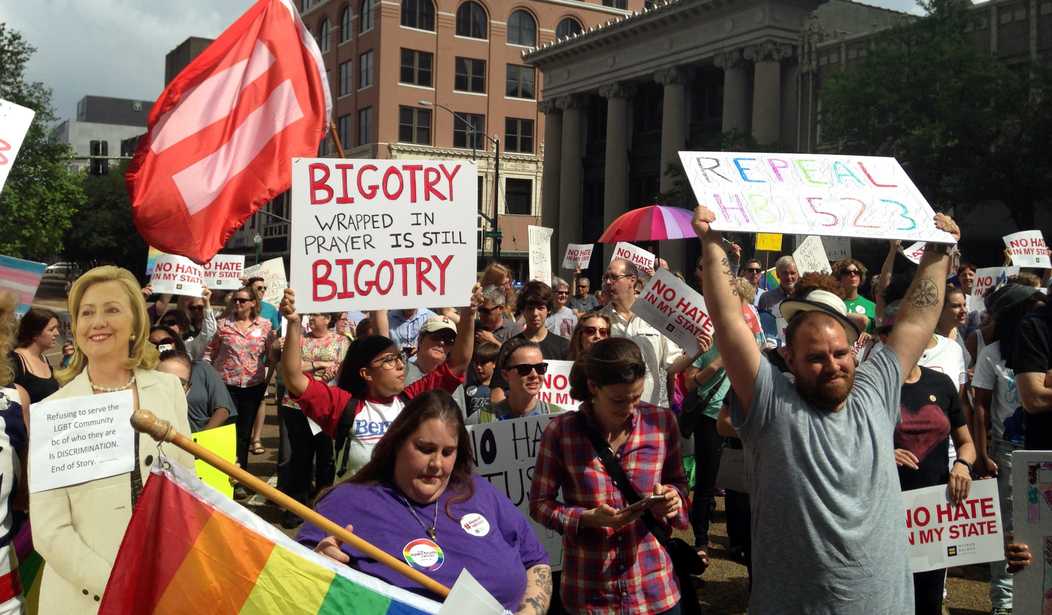PayPal and Salesforce, two of the businesses that rose up against religious freedom laws in Indiana and North Carolina, are reportedly leading a preemptive strike against similar legislation in 2017.
PayPal was the first top-drawer tech company to pull out of North Carolina in 2016 after Gov. Pat McCrory signed legislation that blocked local governments from passing religious freedom ordinances or anti-discrimination protection for lesbian, gay, transgendered or bisexual people.
“Our decision is a clear and unambiguous one,” wrote Dan Schulman, PayPal’s president and chief executive, in a company blog post at the time. “As a company that is committed to the principle that everyone deserves to live without fear of discrimination simply for being who they are, becoming an employer in North Carolina, where members of our teams will not have equal rights under the law, is simply untenable.”
Salesforce CEO Marc Benioff spoke out against Indiana’s Religious Freedom Restoration Act in 2015. He was one of the critics of the legislation who painted the RFRA as being blatantly discriminatory against the LGBT community.
The day before Gov. Mike Pence was scheduled to sign the bill, Benioff threatened to stop a company expansion in Indiana. After Pence signed the bill, Benioff did himself one better. Benioff announced plans to cancel all Salesforce programs that involved customers or employees traveling to Indiana.
Then, a week after that, Benioff approved company-paid relocation packages for employees who wanted to get out of Indiana.
“I just got an email on the way to studio from another employee who said, ‘look I don’t feel comfortable living in this state anymore, you have to move me out,’ and I gave him a $50,000 relocation package and said, ‘great, you’re clear to go,’” Benioff told CNN in April 2015.
Now, with a slew of Republican state legislators — rookies and incumbents — moving into their offices for 2017 sessions, PayPal and Salesforce are looking at LGBT rights from a preemptive, rather than reactive, point of view.
BuzzFeed reported that an invitation-only planning summit was convened in San Francisco on Nov. 15. It was expected to include as many as 100 leaders of LGBT rights groups and like-minded business leaders.
An invitation to the summit, obtained by BuzzFeed, showed the Human Rights Campaign, Freedom for All Americans, the National Center for Transgender Equality, Lambda Legal, the ACLU, Gill Action and the Transgender Law Center would all be making presentations.
“The tide of legislative attacks has been increasing,” Jenny Pizer, the law and policy director of Lambda Legal, told BuzzFeed. “Businesses have played an evermore decisive and high-profile role in saying ‘no.’”
Project Q Atlanta, an LGBT-friendly website, has already warned its readers that the Georgia GOP was planning an “anti-LGBT legislative assault.”
“Republican lawmakers in Georgia are itching for another fight over anti-gay ‘religious freedom’ legislation and are now exploring breaking their bigotry into bite-size pieces and passing several bills,” Matt Hennie, the owner and editor of Project Q, wrote. “After all, Republicans have an insatiable appetite for anti-gay bills.”
In the Lone Star State, Chris Wallace, president of the Texas Association of Businesses, is mobilizing his group’s 4,000 members to stop Senate Bill 92, which is likely to be debated in 2017.
It would overturn municipal ordinances protecting the rights of LGBT people in five Texas cities.
Wallace told KETR-FM he is afraid SB 92 could have the same negative impact on Texas that HB 2 had on North Carolina.
“We want to keep Texas open for business. We want to maintain an environment that keeps companies moving here, that keeps companies growing and expanding our tax base,” Wallace said. “Why would you want to introduce any type of legislation that would hinder business?”
Texas GOP legislators are also expected to introduce the Women’s Privacy Act, which is supported by Lt. Gov. Dan Patrick. It would prevent transgendered people from using the restroom of their choice.
“Bills designed to embarrass transgender Texans are social bills that only serve to divide us when we should be working together,” Rep. Celia Israel (D), who is a lesbian, told the Austin Chronicle. “I’m hopeful we can make a business case.”
What she and Chris Wallace would call “a business case,” Lt. Gov. Patrick described as “all fear mongering” in a KERA-FM interview.
He said the lack of calamity following voter rejection of Houston’s LGBT-friendly HERO ordinance proved that what happened in North Carolina won’t occur in Texas.
“We had the Final Four, we have the Super Bowl coming and we have more business moving to Houston than most major cities in the United States. It is just nonsense,” Patrick said.
Still, Chase Strange, an ACLU attorney, told the AP that transgender people are “concerned for their safety, survival and legal rights” because of GOP November election victories in scores of state legislatures.
Beyond their right to use the bathroom of their choice, or getting a wedding cake baked, the AP also reported some LGBT activists are worried that gay and transgendered people will be physically attacked.
Dana Beyer, executive director of Gender Rights Maryland, said she is encouraging transgender people, and the parents of transgender youths, to move to “safe spaces” — cities and states with legal protections and a supportive culture.








Join the conversation as a VIP Member